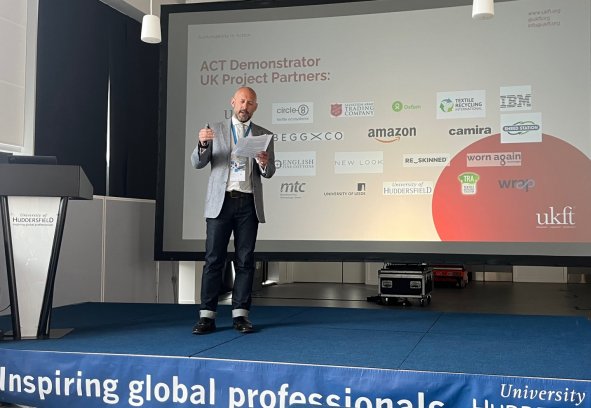
Hybrids dominate at Composites Europe 2018
Opinion


Collaboration is key to creating a huge demand for circular textile products, conference is told.

5th July 2023
Adrian Wilson
|
Huddersfield, United Kingdom
In his keynote speech at the 92nd Textile Institute World Conference in Huddersfield, UK on July 4th, Adam Mansell, CEO of the UK Fashion and Textile Association (UKFT), outlined the huge opportunity that now exists for textile recycling – it is predicted to become an industry generating €2 billion in profits by as early as 2030.
UKFT is currently leading a £4 million project to develop and pilot a fully-integrated, automated sorting and pre-processing demonstrator for waste textiles which could eventually divert thousands of tons from landfill each year.
“At present, it costs collectors £100 to deal with a ton of non-recyclable textiles, most of which ends up in landfill,” Mansell said. “If we get this right, that same ton of waste could have a market value of £1,000.”
He observed that textile recycling was first developed in the West Yorkshire region over 200 years ago and was now back, with the establishment of new recycling machinery at contract fabrics supplier Camira as a first step.
“The uptake of recycled polyester for textiles has grown to nine million tons, but virtually all of that is made from PET bottles, so we are taking product out of a closed loop system, which is not the way forward,” Mansell said. “It’s also pointless trying to persuade people to buy less, because this is not a consumption problem but one of waste. What we need to do is make fibre-to-fibre recycling profitable. The technology is already there for recycling and the bottleneck is in collecting and sorting. If we can get that right, we can create a huge demand for circular textile products.”
Transition
ACT UK – the Autosort for Circular Textiles Demonstrator – is a two-year project that will support the transition from uneconomic manual sorting of clothes and textiles that are not suitable for resale to highly-automated sorting and pre-processing, which can then be used as feedstock for existing and emerging recycling processes.
The project brings together a consortium of recycling technologies, textile collectors/sorters, academia, manufacturers, industry associations, technologists and brands/retailers, supported with funding from Innovate UK.
Over one million tons of textile waste is generated annually in the UK and estimates suggest that a third of is non-rewearable and being lost to landfill/incineration or exported to be sorted in lower cost labour regions.
Manual sorting of used textiles has its limitations. It is not possible to manually sort garments by fibre composition and pre-processing (button, zip and trim removal) and sizing steps required by textile recyclers haven’t been optimised and customised to meet individual specifications. No scaled process currently exists which brings all of this into one industrial process or facility.
ACT UK will build on sorting approaches that are currently coming to market in countries such as the Netherlands, Spain and Sweden and will combine and advance existing and new supporting technologies to overcome current barriers. It will bring together optical scanning, robotics, AI, pre-processing and size reduction equipment all under one roof.
Collaboration
“What happens to our textiles when we no longer need them is a growing problem that we cannot ignore,” Mansell said. “We’re aiming to create a model to sort and prepare waste textiles for recycling in a way that’s never been done before, and at scale. A national system of recycling plants could save hundreds of thousands of tons of material from entering landfill. In turn, the system could generate huge volumes of material for use across the UK textile manufacturing sector.
“Collaboration is a part of everything we do at UKFT and despite the challenging times we are in, I’ve never known the textile sector to show such a positive attitude and now we need to harness the power of collaboration to turn this current challenge into a major opportunity.”
ACT project partners include Amazon, IBM, Marks & Spencer, Tesco, Pangaia, New Look, Reskinned, Salvation Army, Oxfam, Textile Recycling International, Shred Station, Worn Again Technologies, English Fine Cottons, Alex Begg, Camira, Manufacturing Technology Centre, University of Leeds, University of Huddersfield, the Textile Recycling Association and WRAP. Other partners are expected to join the consortium.

Business intelligence for the fibre, textiles and apparel industries: technologies, innovations, markets, investments, trade policy, sourcing, strategy...
Find out more